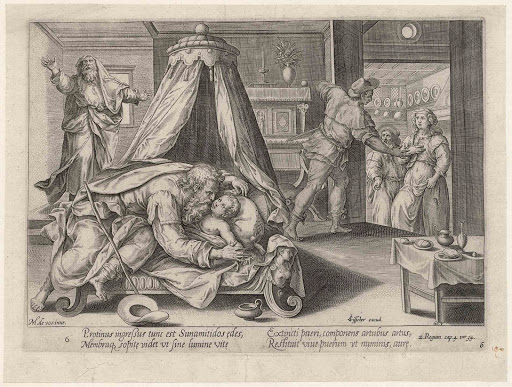Jan Collaert I (aka Hans Collaert) (c1525/30–1580)
“Elisha Reviving the Son of the Shunammite Woman,”
c1579 (published 1643), plate 6 from the series of 6 plates (Hollstein 122–127
[de Vos]), “The Story of Elisha,” after the design by Maarten de Vos
(aka Maarten de Vos; Maerten de Vos) (1532–1603), initially published by Volcxken
Diericx (Volcxken Dierickx; Volcxken Diericx) (fl.1570–1600) and later (as inscribed
on this impression) by Claes Jansz. Visscher (aka Nicolaes
Jansz.Visscher; Piscator) (1587–1652) in 1643 (possibly in “Thesaurus Sacrarum
Historiarum Veteris Testament”).
Engraving on laid paper with small margins backed with
a support sheet.
Size: (sheet) 23.8 x 31.3 cm; (plate) 20.8 x 28.9
cm; (image borderline) 19.1x 28.5 cm.
Inscribed on plate within the image borderline
along the lower edge: (left) “M.de vos. Inue.”; (right of centre) “CVisscher
[ligature of initials monogram] excud.”; (below table leg at right) “HC. F”.
Numbered and lettered on plate below the image
borderline: (left) “6”; (centre in two columns of Latin in two lines) “Protinus
ingressus tunc est Sunamitidos edes,/ Membraq[ue] sopite videt vt sine lumine
vite// Extincti pueri, componens arubus artus,/ Restituit viue puerum vt
numinis, aure.”; (right) 2.Regum cap.4
ver 34./ 6”.
State iv (of iv)
Hollstein 127 (Christiaan Schuckman [comp.] 1996, “The
New Hollstein: Dutch and Flemish Etchings, Engravings and Woodcuts 1450–1700: Maarten
de Vos,” vol. 44, Rotterdam, Sound and Vision Rijksprentenkabinet, p. 37, cat.
no. 127); New Hollstein (The Collaert Dynasty) 64–4(4) (Ann Diels &
Marjolein Leesberg [comp.] 2005–2006, “The New
Hollstein: Dutch and Flemish Etchings, Engravings and Woodcuts 1450–1700: The
Collaert Dynasty,” vol. 8, Ouderkerk aan den Ijssel, Sound and Vision, p. 76,
cat. no. 64); Riggs 196 (Timothy A. Riggs 1977, “Hieronymus Cock: Printmaker
and Publisher,” New York, Garland Publishing).
The Rijksmuseum offers the following description
of this print:
(Transl.) “When Elisha has arrived, Gechazi closes
the door to the room on the right. The parents of the dead boy remain outside
the room. On the left, Elisha prays with raised arms to God. In the centre, he
stretches out over the [dead] boy with his mouth on his mouth and his palms on
the boy's palms. This is how Elisa brings the boy to life. Below the scene a
reference in Latin to the Bible text in 2 Kgs. 4:34.”
(http://hdl.handle.net/10934/RM0001.COLLECT.616145).
See also the description of this print offered by
the British Museum and the Museum of Fine Art (Boston):
https://www.britishmuseum.org/collection/object/P_1937-0915-90;
https://collections.mfa.org/objects/171058.
For those unfamiliar with the biblical event
portrayed in this engraving, the following link offers an explanation:
https://www.gotquestions.org/Elisha-Shunammite-woman.html.
Condition: well-printed strong impression with
small margins laid onto a sheet of archival (millennium quality) washi paper. There
are closed tears in the margins and an ink inscription by an old hand at lower
right in the margin (recto), otherwise the sheet is in a good condition for its
age with no folds, losses, abrasions, significant stains or foxing.
I am selling this event-filled engraving exemplifying
the Flemish Mannerist leaning towards lively rhythms, theatrical gestures and spatial
ambiguity for AU$289 (currently US$206.89/EUR175.06/GBP158.13 at the time of
this listing) including Express Mail (EMS) postage and handling to anywhere in
the world, but not (of course) any import duties/taxes imposed by some
countries.











No comments:
Post a Comment
Please let me know your thoughts, advice about inaccuracies (including typos) and additional information that you would like to add to any post.